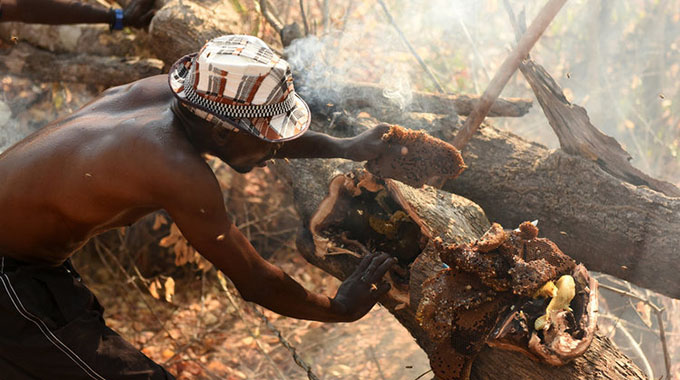Bees sing, sting but a patient man never misses a thing

Isdore Guvamombe Saturday Lounge Reflections
BACK in the village, in the proverbial land of milk, honey and dust or Guruve, patience can cook a stone. There, fortune is like groundnut, you have to crack it open to enjoy the innards.
In Chitsungo communal lands, a spitting distance from the confluence of Dande and Hunyani (also known as Manyame) rivers, the onset of the dry season, is time to harvest honey and fruits. It is time for plenty.
Honey in particular, has always been a delicacy cherished by generation after generation.
Three men — Birijoni (Bill John), Baba vaKatonje (named after a son born prematurely and kept in the wool until maturity) and Nhosiwero (knows well) — were among the greatest honey hunters and gatherers. But none of them trusted the other. Only bravery, dexterity and greed brought them together.
The land has huge trees dotted across its vast tracts of land and in some trees; bees take advantage of small holes and turn them into hives. There, the most succulent honey is found. Natural honey is the sweetest. It beats even European sugar.
One windy afternoon, the three set out to harvest honey from the big tree on the outskirts of the village towards Chitsungo Mission.
The big tree was the legend of the village, forever quiet, save for the swaying branches, the singing leaves that always took their tune from the westerly winds.
At night, it was rumoured that it was the meeting place for witches.
On a hot day, cattle and donkeys enjoyed the shed and their droppings told the story of the shed being the meeting place.
Goats and sheep also squeezed themselves among the cattle and donkeys and competed in gambolling tree leaves and fruits that dropped from the old man’s lush green armpits.
The big tree or the old man as the villagers metaphorically called the oldest tree around, had in the past several months housed bees and the trained eyes of Birijoni, Baba vaKatonje and Nhosiwero certified that it was time to harvest the honey.
The hole was pregnant with honey and the harvest would be big.
The afternoon, especially towards sunset was the best place to start harvesting.
Armed with axes, knives and containers — they went for the tree. They used the axe to cut out steps to the beehive.
Using their wisdom or lack of it, the bees had chosen a hole where a huge branch grew from the main trunk. It was high up, about three metres and needed someone with courage and skill to get there and safely tap into the honey.
The sun, being the king of torches never stopped. It does not stop.
The tree and the men’s shadows lengthened as the sun began its precipitate descent. Birijoni was the most daring. He went up the tree, no ladder and an axe in one hand.
There he clung precarious on the branch, using one hand to cut open the hole. The bees were upset, and soon they swarmed and sang war songs.
The war cry became loud and louder and the smoke used by Birijoni, seemed to upset the bees instead of suppressing and cowing them.
On the other hand, the sunset wind increased in speed. The branches swayed and the leaves sang. It was not clear whether the tree was protesting or happy, for, both men and bees were intruders on its privacy.
For the men who took turns going up the tree and trying to cut it open, nightfall was abrupt, as if the autochthons of darkness had risen up and swallowed the sun. So suddenly the sun was low into the belly of mother earth.
The three men agreed to abandon the job and resume at sunrise. In the dark, they followed a bush path that petered out into the greying fine sand.
Baba vaKatonje, being the eldest was the most compassionate of the three and he promised to pick them up in the morning as he came from the furthest point of the village.
“A patient man will eat ripe fruit. At the bottom of patience one finds heaven,” quipped Baba vaKatonje, realising that his colleagues, especially the recently married Birijoni, were disappointed to go home empty-handed.
Way before sunrise, the time elephants normally bath on the Zambezi and Dande rivers, Nhosiwero, woke up and slithered, like a snake to the tree to harvest one or two calabashes, before his colleagues came.
He knew he was breaching their trust, but he would harvest and get back home, then rejoin them.
He would pretend he never got there; after all, as a recently married man, Birijoni would never wake up early, for do village elders not say never make an early morning appointment with a newly-married man, he will not make it?
With his axe and calabash Nhosiwero climbed up the big tree, helped by his globe eyes. The tree branch had developed a huge crack during the night. It was opening and snapping back with the movement of the wind.
The honey was slightly exposed and he needed to quickly harvest and go before his colleagues came back. He was winning. He dropped his axe, clung precarious on the tree branch with his bare feet and tried harvesting.
The tree branch opened again as if to say to him, here is the honey.
Suddenly Nhosiwero slipped and his left foot was caught up in the crack between the tree and branch. There he dangled legs up and head down. He tried to recover, but it was not to be.
There was misalignment of the feet and knees. The pain was excruciating. The bees stung, amid an emphatic buzzing war cry. Moments later there was cramp on his leg and he tried to move, but the tree pulled him back. He cried loudly waking up many in the village.
Do village elders not say that if you want to go quickly, go alone, if you want to go far, go together?
Do they not say, the day a monkey is destined to die, it finds all trees slippery, with dogs in hot pursuit?
By the time villagers arrived, Nhosiwero, thought death was the most appropriate outcome. He had suffered enough.
His face streaked with mucus, sweat and excreta. He was in an awkward position, head down.
Excreta flowed and came to finally make drops off the forehead. It was a sad spectacle. There was also here and there a great splash of red, where he had haemorrhaged. Gobs of phlegm rose into his mouth and he did not have even the strength to spit them out.
There was rattling in his throat, a lift, a flare in the rib cage.
He groaned and writhed in agony, his tongue coming out flicking across his dry thick lips, intermittently. Each villager threw down his axe or spear as he arrived and noticed the rare spectacle.
One or two climbed up, but failed to help. Schoolchildren on their way to Chitsungo Mission stopped and watched in disbelief.
It was only when a tractor passed by that a plan was hatched to use chain to pull apart the huge branch.
When the tree was eventually pulled apart, Nhosiwero who had by now been tied with a rope around his waist, slowly dropped to the ground.
The bees went more mad and offensive, singing their buzzing war cry. Stinging. Flying, stinging, stinging, and stinging. Singing. Protesting. Stinging and still singing.
Villagers dispersed, rushing Nhosiwero to the mission hospital.
His body had swollen. The bees, the pain and everything. It was the fruit of greed, dishonesty and impatience. In the village a patient person never misses a thing. In the village, the village, yes the village.









Comments